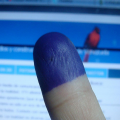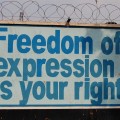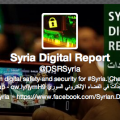Stories from April, 2013
Cameroon: Blogger Enoh Meyomesse Still in Jail
Cameroonian writer and blogger Enoh Meyomesse has been in jail for over 17 months. Accused of stealing and illegally selling gold, he was sentenced to seven years imprisonment after a process that several organizations considered illegitimate. Free expression advocates believe that authorities wish to silence Meyomesse, who has written extensively about human rights violations and inequality in the country.
AFTE Releases Legal Guide to Digital Security for Arab Human Rights Activists
The Association for Freedom of Thought and Expression, in Egypt, issued a “legal guide to digital security” as part of its digital freedoms programme. The guide was produced for campaigners and human rights activists and lawyers interested in freedom of digital expression and the confidentiality of communications and information stored on mobile phones, computers or any other device used to store or distribute data or information
Will the Revolution Still be Tweeted? Venezuela's Netizens Face Uncertain Future
Since the death of Hugo Chavez and narrow victory of Nicolas Maduro in Venezuela, two social media users have been arrested for posting information deemed “destabilizing” to the country. On election day, the Internet was briefly shut down throughout most of the country. And today, social network users are facing threats to their employment status, as authorities search profiles for signs of political affiliation that have, in several cases, resulted in users losing their jobs.
Peru: The Cyber Crime Bill is Back
The Cyber Crimes Bill or #LeyBeingolea, was on the Congress agenda last week but was never addressed. The controversial Denial Bill was also there, which would penalize those who "approved, justify, deny or minimize crimes committed by members of terrorist organizations."
Human Rights Verdict Could Affect Cisco in China
In 2011, two separate lawsuits were filed against Cisco Systems alleging that its technology enabled the government of China to monitor, capture, and kill Chinese citizens for their views and beliefs. To what extent are these human rights violations attributable to technology provided by Cisco?
Japan: The Police Don't Want You to Use Tor [UPDATE]
According to an April 18 news report, Japan's National Police Agency may soon urge Internet Service Providers to 'voluntarily' block the use of Tor, the anonymous online communication system. The NPA report carrying this announcement has not been formally released; whether NPA will actually put this move into practice remains unknown.
Hong Kong Citizen Media Site Faces DDoS Attack From China
Hong Kong-based citizen media platform inmediahk.net was hit by a DDoS attack last week, coming mainly from China. Inmedia, a volunteer citizen media network, has been blocked in mainland China since 2007. Inmedia members believe that recent coverage of controversial issues, including a dock workers' strike in Hong Kong and the construction of a military pier in the city's center, may have triggered the attack.
#FreeRod: Preliminary Victory in Chilean Twitter Parody Case
A court in Chile has dismissed claims against Chilean Twitter user Rodrigo Ferrari, who was facing prosecution for operating a Twitter account that parodied millionaire Andrónico Luksic. The decision is not final and may be reviewed by the Court of Appeals, but it is a good sign for the future of online free expression in Chile.
Mexico: Another Voice Goes Silent [UPDATE]
A social media user known only as Valor Por Tamaulipas recently announced plans to close Facebook and Twitter accounts that have become popular sources of information on drug violence in northern Mexico. Valor por Tamaulipas (Courage for Tamaulipas) has been using social media to crowdsource reports from citizens in the state of Tamaulipas, which has been riddled with drug-related conflict and corruption since 2006.
Venezuela: Facebook User Detained for “Destabilizing” Photograph
Two days after presidential elections in Venezuela, authorities detained Andrés Rondón Sayago, a citizen who allegedly spread photographs of burning ballots. Officials say that the photographs were taken during 2007 elections, not in the present day. Rondón Sayago has been accused of sharing the photographs with “destabilizing intentions.”
The Psychological Strains of Digital Activism
Iran's Green Movement marked one of the first large-scale movements where new media served as a platform for coordination and communication between activists and played a vital role in showing the world what was happening on the ground. The post offers a first-person narrative on this experience from Cameran Ashraf, an Iranian-American citizen living in the United States who helped facilitate communication and information exchange for activists and protesters during this period.
GVA and EFF Seek Joint Interns
The Electronic Frontier Foundation (EFF) and Global Voices Advocacy (GVA) are jointly seeking two interns to work from EFF’s offices in San Francisco for summer 2013. University students and recent graduates with excellent writing skills and a deep understanding of free expression, openness, and privacy on the global Internet are strongly encouraged to apply.
Venezuela: Internet blocked for “three minutes” on Election Day
Late on Election Day in Venezuela on Sunday, April 14, Internet access through the country's primary service provider CANTV was interrupted for about twenty minutes according to users' declarations and for "no more than three minutes" according to the authorities.
Wikipedia's Suicide Mission Against Russian Censors
Smoking cannabis is dangerous business for people the world over. In Russia, just writing about it online can get you in trouble. State officials informed Wikimedia Russia that the government has placed its “Cannabis Smoking” article on its blacklist of illegal websites.
Chadian Blogger Detained
Internet Without Borders reports that Jean Laokolé, a Chadian blogger and writer, was arrested on March 22 by security forces in N'Djamena, Chad's capital. In a petition released today, the advocacy group calls for the blogger's "immediate and unconditional release." Laokolé writes under a pseudonym for one of Chad's most popular blogs, where he covers corruption and other problems in politics.
Netizen Report: Tibetan Internet Users Targeted With Malware
Global Voices Advocacy's Netizen Report offers an international snapshot of challenges, victories, and emerging trends in Internet rights around the world. Highlights this week include China's efforts to deploy new surveillance tactics against users in Tibet, the questionable prison sentence of an Azeri web editor, and WordPress' decision to step up their game on user security.
SecDev Foundation to Monitor Syria’s Digital Security
SecDev Foundation is launching the Syria Digital Security Monitor, a site that maps and visualizes reports of disruption to critical infrastructure in Syria including internet, telecommunication, electricity and water, and reports on cyber threats.
Facebook's Graph Search: Be Careful What You “Like”
Facebook's new Graph Search tool allows strangers -- anyone from casual acquaintances to government actors -- to discover information about you that you may not have intended them to find. This post explores the impact of this new tool on users and offers a few ideas on how to keep your information from becoming public without your consent.
Bangladesh: Global Voices Condemns Assault on Bloggers
The Global Voices community, comprised of bloggers, writers, and activists from more than 100 countries, wish to express our concern about the current state of freedom of expression online in Bangladesh. We call for the immediate release of detained bloggers and urge government actors to uphold their commitments to national law and international human rights doctrine.
Kuwaiti Twitter User Jailed for Insulting Emir
Insult the Emir on Twitter and go to jail: Hamid Al Khalidi has been sentenced to two years in prison for insulting the Emir of Kuwait on Twitter. His attorneys plan to appeal his case to a higher court next week.























